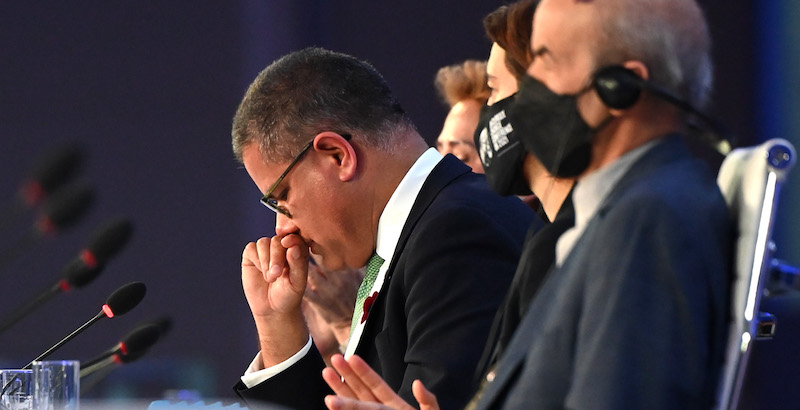Between Saturday night and Sunday, after the closing of the final agreement for COP 26 in Glasgow, the feeling among participating negotiators and outside observers was disappointment. Alok Sharma, Conference President, Saturday evening had been movedHe said he was “extremely disappointed” and that China and India, which had recently contributed to softening the scope of the agreement, would have to “explain to countries going through climate change why they did what they did.”
Boris Johnson, Prime Minister of the United Kingdom, the host country, said that “the joy of the progress that has been made is tinged with disappointment,” and John Kerry, the US climate envoy, was also disappointed. The representative of the Pacific countries, whose island nations are among the most vulnerable to climate change, said that COP26 was “miserable failure‘, although others were more optimistic.
Even if you take them into account Conference Objectives Via the regulators themselves, it is easy to say that the expectations of COP26 were ignored: the first goal, which is to renew plans to reduce emissions in various countries, was not achieved. In general, the main goal of the conference, was to “keep 1.5 degrees Celsius alive” (a term that has spread widely in recent days, indicating an attempt to keep the possibility of limiting the increase in global average temperatures below 1.5 degrees). °C compared to pre-industrial levels) is difficult to quantify: progress in limiting the increase in global temperatures has been relatively little in Glasgow.
Despite this, there were many positive news. Although no new promises were made on emissions this year, the participating countries will have to re-discuss them next year, and this was not a foregone conclusion. Moreover, for the first time in the history of the Final Agreements of the United Nations Climate Conference, fossil fuels and the need to reduce their use are mentioned: oddly enough, it may seem that it has not been mentioned before, this is also a consequence.
(AP Photo/Scott Hebel)
The most frustrating part of the agreement was certainly the modification, decided at the last minute, to the part dedicated to getting rid of fossil fuels, particularly coal. And the first draft of the agreement, which was circulated a few days ago, talked about “phasing out the use of coal and financing fossil fuels.” The second draft, circulated shortly after, did indeed loosen the obligation, but the final version softened it a lot: there was no longer talk of a gradual elimination of coal use, but of a “gradual reduction”.
This change, demanded by large coal-using nations such as China and India, has been heavily criticized, as it greatly reduced the scope of what would have been one of COP26’s biggest developments. Moreover, now that the compromise has been reached, it will be difficult to improve and adjust it at the conferences of the next few years.
Despite this, this is the first time that fossil fuels are mentioned in a COP outcome document.
– Read also: India’s commitment to climate has its reasons
Another disappointment (but this is already evident before the conclusion of the conference) relates to the Nationally Determined Contributions (NDC) to carbon neutrality, that is, the promises of countries to reduce emissions to reach the state where many greenhouse gases are emitted. removed from the atmosphere. At COP26, none of the greenhouse gas-producing countries renewed or upgraded their NDCs, Apart from India. Other large countries and regions, such as the European Union, the United States and China, have announced their commitments in the past years, and have not updated them in Glasgow.
This is a serious problem, because according to various analyzes, current promises on carbon neutrality, if not improved, lead to Global temperature increase well over 2°C by the end of the century, with Serious consequences globally.
However, it was clear from the start of the conference that there would be no political will in Glasgow to make new commitments on emissions reductions by the major nations. For this purpose, the best possible precautionary measure has been adopted: in the final document, countries are asked to re-discuss their NDCs next year, at the 27th COP in Egypt, and then at the next conference. Repeating NDCs each year is not a foregone conclusion: Under the Paris Agreements, countries are required to review their emissions commitments only once every five years. Talking about it every year can be at least a way to assess progress.
– Read also: Zero emissions, good explanation
Another key point of COP26 relates to the economic aid that the richest countries should give to the poorest to help them reduce emissions and tackle the impact of climate change. In 2009, at the Conference of the Parties in Copenhagen, rich countries promised that by 2020 they would send at least $100 billion annually to the poorest public and private aid. But that didn’t happen: In 2019, the last year for which data is available, aid was 80 billion.
In Glasgow, the rich nations renewed a promise they made more than 10 years ago, setting up a $500 billion fund to be paid out over 5 years. Half of this money should go to emissions reduction projects and the other half to “adaptation” projects, that is, to reduce the impact of climate change. This was an important request from poor countries: a large part of the aid sent so far has been allocated to projects to reduce emissions, such as the development of renewable energies. But these projects usually don’t need much help: if done correctly, they make profits and finance themselves.
For this reason, poor countries have requested an increase in their share of the funds for “adaptation” projects, which are often non-repayable and which rich countries are reluctant to give. Again, the improvements are only incremental: provisions were made more than 10 years ago, and in Glasgow they have only been confirmed, made more balanced in delivery methods.

“Coffee fan. Tv specialist. Social media aficionado. Zombie geek. Evil analyst. Web expert.”







More Stories
US aid to Ukraine and Kiev suffers from troop shortages and timing problem. “The situation is desperate until the fall.”
The European Parliament calls for a halt to Russian interference, but the FDI Fund, the League and the Five Star Movement abstain. Gozi: “Here is the pro-Putin party.”
Spain, corruption investigations into the wife of Prime Minister Sanchez. It's a storm, are you going to quit? – the weather